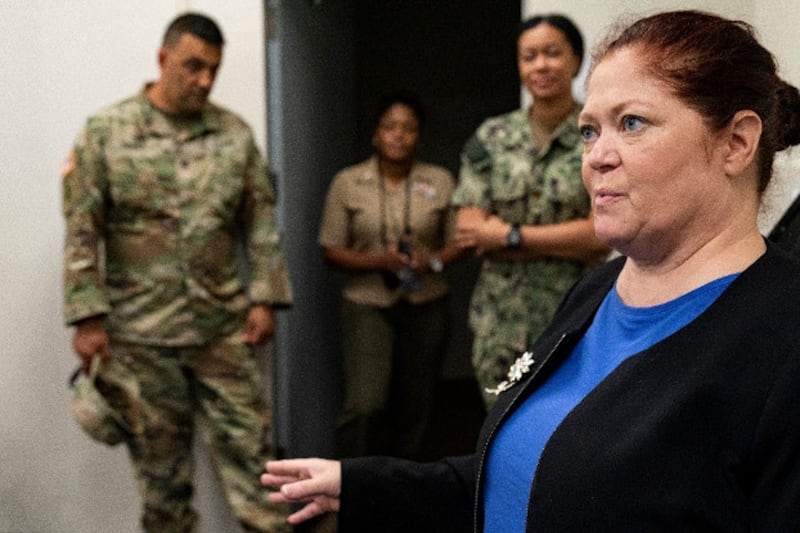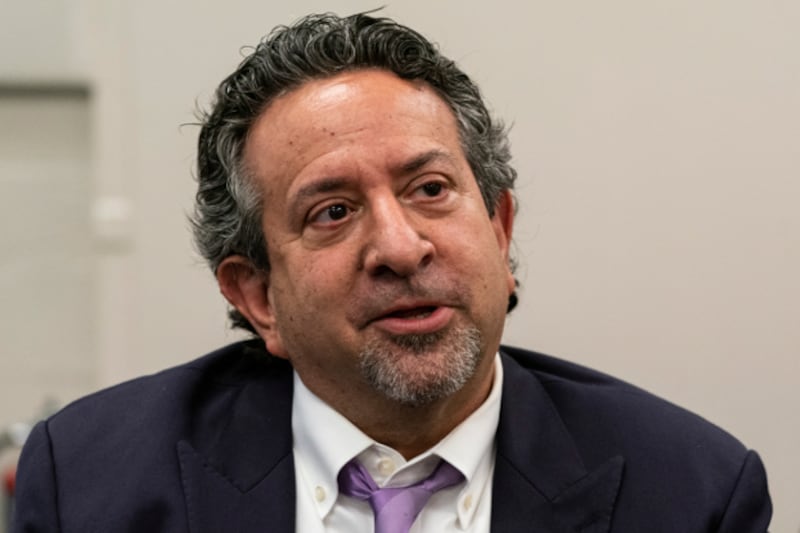The arraignment of three Southeast Asian terror suspects before a U.S. military tribunal at Guantanamo Bay wrapped up on Tuesday but without any of the defendants entering a plea and their lawyers expressing frustration and doubt about the fairness of the proceedings.
The two-day court appearance was the first for Indonesian Encep Nurjaman, who is more commonly known as Hambali, and for Malaysians Mohammed Nazir bin Lep and Mohammed Farik bin Amin since they were locked up at the American navy base in Cuba 15 years ago. All three men were arrested in Thailand in 2003 and sent to secret CIA-operated “black sites” before being moved to the military prison at Guantanamo Bay in 2006.
Commander Hayes Larsen, the military judge overseeing the case, closed the arraignment without setting a schedule for the trial to continue after hearing defendants’ decisions.
“I suspect what will happen in court is that we are going to be working long hours on appeals,” lawyer James Hodes, who represents Hambali, told BenarNews by telephone shortly after the hearing ended.
Hodes and attorneys Christine Funk, who represents bin Amin, and Brian Bouffard, who represents bin Lep, spent much of Monday raising objections about what they called inadequate translations their clients were hearing during the proceedings. Much of Tuesday’s portion of the hearing went into the reading of the charging documents against the three.
During the first day of the hearing, defense lawyers also objected that an interpreter who previously had translated for the defense was sitting with the prosecution team. The judge denied a defense request to have the translator removed from the courtroom.
“This isn’t play time,” Hodes told BenarNews about the objections. “We’re all very frustrated.”
Joshua Kastenberg, a University of New Mexico law professor and former Air Force judge, said they were right to raise their concerns about the interpreter sitting with prosecutors and get those concerns on the record.
“It could be an unfair leg up in the trial. Those are damn good points and I stress the damn on that,” he told BenarNews.
He also said the defense lawyers were right to argue for accurate interpretations of testimony, calling them fundamental to a proper trial.

The proceedings were broadcast remotely to some reporters who were covering the arraignment from Fort Meade, a U.S. Army base in Maryland near Washington. The military asked members of the media who were attending the hearing at Camp Justice at Guantanamo Bay as well as those watching it from Fort Meade not to take photographs or video while the arraignment was in progress.
Hambali, bin Lep and bin Amin were in court both days and could be seen when their attorneys addressed the court – the three wore western-style clothing on Tuesday after wearing long tunics and loose trousers the day before. Because the defense lawyers raised fewer objections as the affidavits were read, the defendants were seldom seen on day 2.
Hodes said the defense teams had no time-frame for the case to resume or when it could conclude, adding that he and the other lawyers have not received discovery evidence from the prosecutors.
“It probably won’t be provided until next year,” he said.

Before the hearing, Funk said the defense teams likely would be required to travel extensively to interview witnesses and search for any new evidence, the Associated Press reported.
Her client, bin Amin, is “anxious and eager to litigate this case and go home,” she said.
“Frankly after this two-day arraignment, I didn’t see any evidence that he would get a fair trial,” AP quoted Funk as saying.
After the arraignment, Bouffard said it was so flawed that it should be redone, AP reported.
All three suspects, who were referred to as “alien unprivileged enemy belligerents,” more than a dozen times in the affidavits, face eight charges including seven related to twin bombings that killed 202 people in Bali in October 2002 – Indonesia’s deadliest terror attack to date – and a bombing at the J.W. Marriott hotel in Jakarta in 2003.
The eight charges are conspiracy, murder, attempted murder, intentionally causing serious bodily injury, terrorism, attacking civilians, attacking civilian objects, and destruction of property.
The conspiracy charge alleges the three had conspired with al-Qaeda leader Osama bin Laden and Khalid Sheikh Mohammed – the alleged planner of the Sept. 11 attacks in New York and Washington – beginning in August 1996. The Office of Military Commissions has scheduled pre-trial hearing for Khalid from Nov. 1 to 19 at the Guantanamo Bay court, the Pentagon announced Tuesday.
Bin Lep and bin Amin also face a charge of accessory after the fact for allegedly hindering the apprehension of Hambali between Oct. 12, 2002, the date of the Bali bombing, and about June 30, 2003, by providing false documents, weapons and funds while providing transportation and lodging.
Kastenberg said it was unusual for three defendants to be tried together, and because of human nature, this could create “guilt by association.”
He also expressed concern that the trial was beginning nearly two decades after the three were arrested in 2003 and sent to CIA “black sites” before being transferred to Guantanamo Bay, adding this could affect due process for the defendants.
A report published as part of a U.S. Senate inquiry into the CIA’s secret overseas prison network found that the three Southeast Asians were tortured while in captivity at the so-called black sites.
Khalid Sheikh Mohammed, Hambali and the two Malaysians are among 39 inmates left at the prison inside the U.S. Navy base. At the height of the U.S. war on terror, the prison held close to 800 terrorist suspects from across the globe.
The arraignment was supposed to have taken place in February but was postponed because of concerns about the coronavirus pandemic.
In 2017, the Trump administration announced that it planned to bring terrorism-related charges against Hambali. In January 2021, eight days after President Joe Biden was sworn in as commander-in-chief, the Office of Military Commissions announced that Hambali and the two Malaysians were to be arraigned before a military tribunal.
The Biden administration, meanwhile, has announced that it intends to close down the military prison.
